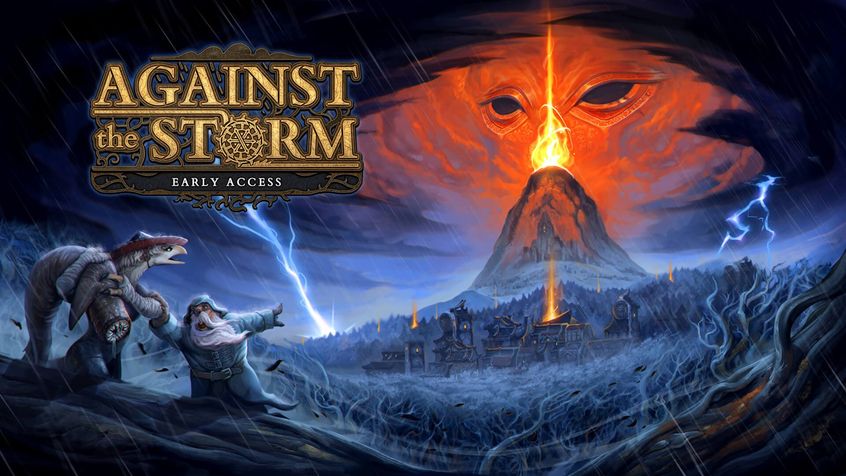Against The Storm
I love city builders. I feel like the sheer number of them I review ought to make that self-evident, but it’s worth repeating. I love how often the idea of building a successful settlement can be iterated upon, and how unique each of those iterations can be. From the most realistic attempts to capture a city, to the more fantastic, each one approaches the question of how to build a city in its own way.
One element I always find interesting, though, is not only the world in which the city is set, but the presuppositions the game’s creators make about what a city needs to be in order to succeed. In my Cities: Skylines review , I argued that the majority of city builders hold neo-liberal ideals about endless growth without consequence at their heart, and I stand by that conclusion. 20 Minute Metropolis provided one good counterpoint, and Frostpunk another, but I think there’s a third counterpoint to be found in Against the Storm. It leads to the idea that a city builder without limitations beyond budget or the needs of a growing population is one that is inherently neo-liberal. City builders with strong survival elements - like Against the Storm - lean away from that. Rather than being neo-liberal, Against the Storm and its version of a city in a fallen world instead expresses not only a new version of a city, but a new political view that I’m going to call disaster-bioconservationism.
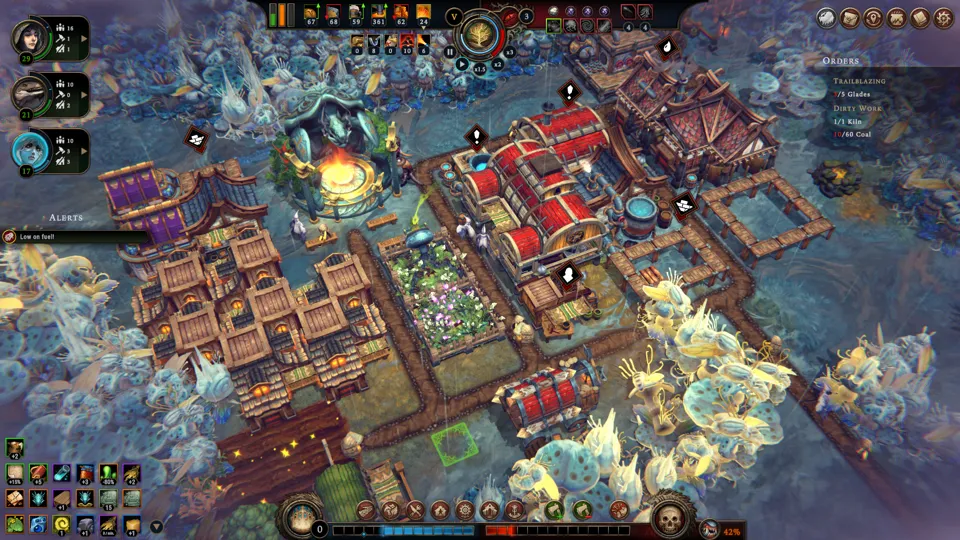 Someday I’ll just review a city builder without insisting it’s a political statement, I promise.
Someday I’ll just review a city builder without insisting it’s a political statement, I promise.
Against the Storm is a city builder set in a fantasy world where storms ravage the world, rendering much of it constantly in flux and uninhabitable. Each season, in the ebb between storms, the Queen sends parties out into the vast forests to scour for resources. The city you build is the result of that endeavour - an expedition started in a clearing and tentatively expanding into the great and terrifying unknown.
The setting is excellent. I always love the feel of the game as I load it up and the immediate sense of isolation that seeing my settlers in a clearing always brings. The art and design complement the sense of impending doom perfectly, blending the bright optimism of the drizzle seasons with the ominous darkness of a storm. Against the Storm exists in a specific subset of fantasy called rainpunk, and makes full use of that aesthetic. The buildings are well designed, with each being clearly visually distinct, but also interesting and fitting in with one another. The various denizens feel like actual intrepid explorers. The look and feel of Against the Storm are excellent, and do a lot to keep the game engaging.
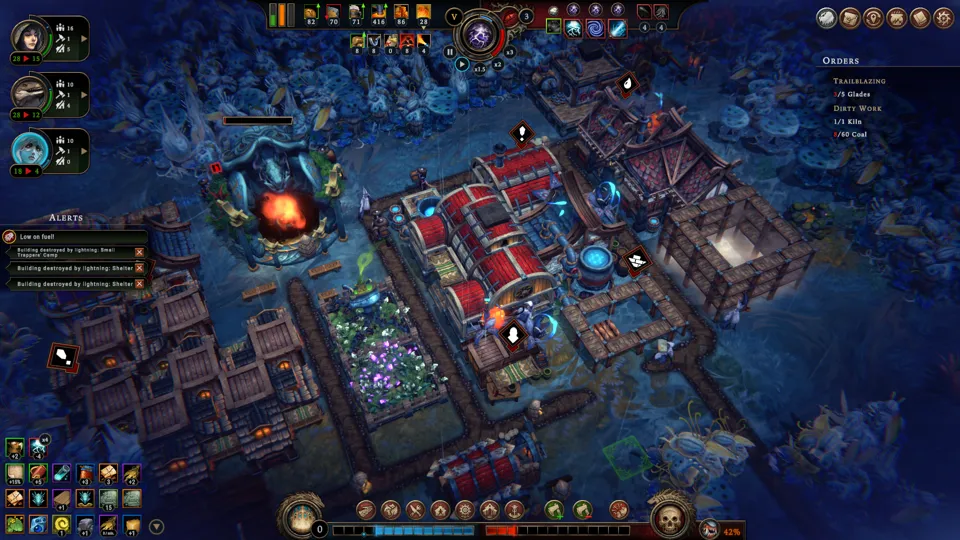 Sometimes, I am not great at managing storms.
Sometimes, I am not great at managing storms.
It’s in the game mechanics, however, that the game both shines and loses a bit of its luster. Each round centres around gaining the queen’s approval, which is achieved by maintaining happiness and completing orders. Orders, available population and resources, and available buildings vary from round to round, so what works in one round won’t necessarily be available in another. This variation in availability and the uniqueness of each set-up should provide a great deal of replayability.
However, as variable as the starting conditions might be, the actual pathway to success remains fairly constant. In every round I’ve played, I follow the same path - invest in trade routes as quickly and as thoroughly as possible, and focus my industry on mass producing whatever goods I’m given the bonuses for. Trade can become such an overpowered mechanic that, no matter what the starting set-up, it can let the player coast through the game with ease. This, in turn, means that while there ought to be huge variations in the experience in each round, in reality, the variation is less in how the round is played, and more in what specific industries are focused on. The gameplay loop remains the same.
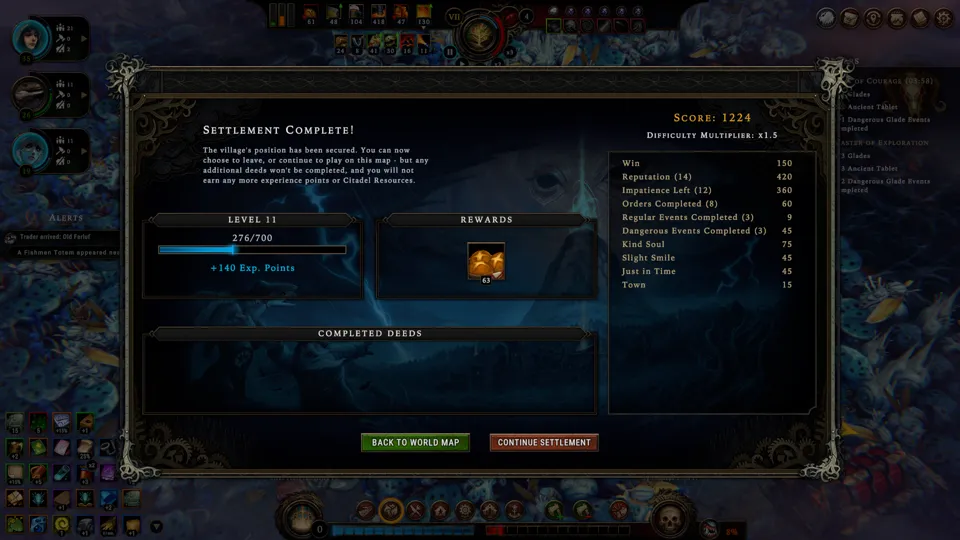 Trade makes the world go brrrrrr.
Trade makes the world go brrrrrr.
This repetitiveness of the gameplay loop is - intentionally or otherwise - also a consequence of the game’s underlying philosophy. Unlike most city builders, Against the Storm recognises that a city must expand and grow, but also establishes itself in a world that pushes back heavily against that expansion. The game understands that the city must grow, and punishes it for doing so. Every time the player explores a new glade or adds new settlers, the forest’s danger level increases, thus increasing the negative effects of the scenario. The incentive and urge to grow, then, are checked by a world that won’t let that growth happen.
It’s in this mechanic that Against the Storm runs into a conflict within its own mechanics and design. On the one hand, the variable scenario set-ups ought to feed into a unique experience in every playthrough. On the other hand, when there are significant disincentives to exploration and expansion, I find myself doing the bare minimum amount of both needed to complete the scenario. Even when I want to keep exploring, I check that impulse because I recognise the rewards won’t be worth the increased danger and hit to morale. This, in turn, means I stick to the strategy I know rather than branching out as the game is encouraging me to do. Indeed, by the end of the game, I’m dreading the arrival of each new batch of settlers, as it means cramming more people into a space that can’t support them, while being ever-cognizant of the extra danger they bring.
In a sense, Against the Storm becomes less a city builder and more an efficiency manager. It encourages the player to figure out how to do as much as possible within as little space as possible. While they are completely different games, this mechanic is not fundamentally different from Rimworld and its balancing of the work that must be done for a functioning settlement versus the needs of an expanding population.
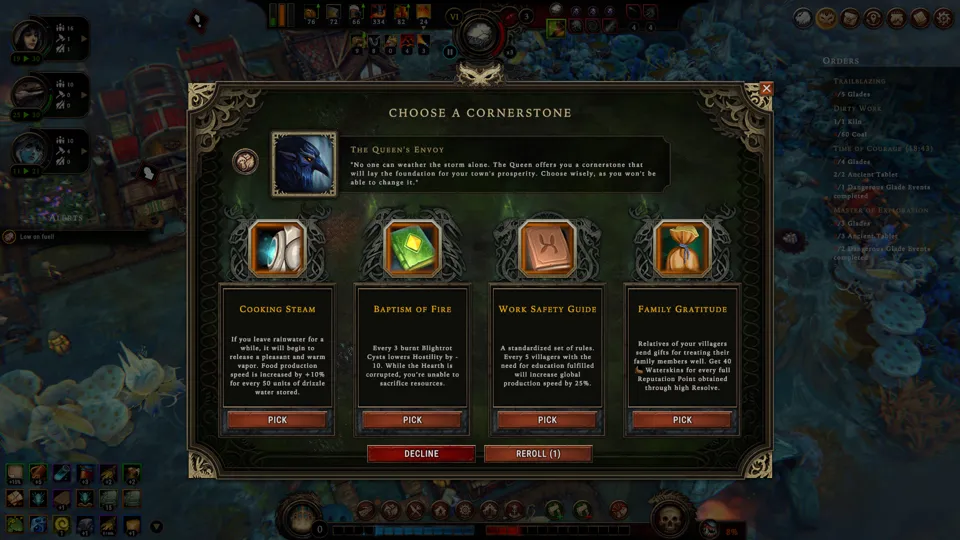 None of these say “trade” on them. :(
None of these say “trade” on them. :(
It’s trying to strike this balance that makes Against the Storm an entirely different class of city builder even from its fellow survival city builders like Frostpunk. Frostpunk sees growth as necessary, but demands heavy sacrifices to get there. Against the Storm punishes growth to the extent that it discourages it, forcing the player to make due with the little they have. It forces a new relationship with the world, one where the cost of every chopped tree and mined ore must be carefully measured against its gain to understand if this is an action worth taking. It is in many ways the antithesis of the standard city builder and creates a sentiment of respect of the environment that must be destroyed for a city to be born. In this regard, it may well be one of the most progressive city builders I’ve played. It recognises cost, and forces the player to consider whether that cost is worth paying before they can expand any further.
What’s fascinating about Against the Storm is that this ideal of bioconservationism has a disaster in a fantasy land as its backdrop. This implies that it’s only in the face of disaster that this type of city could or should be built, or that this ethic ought to be considered. However, I think there is space in a more traditional city builder to explore the cost of expansion. 20 Minute Metropolis provides one model for how this could be done with its transitory resources and Zizek-ian ethos, but it doesn’t have to be alone in that. There is room for city builders to provide ways to reconsider growth and to emphasise its potential costs, even without a climate disaster creating an increasingly hostile world. However, when coupled with a fantasy world, Against the Storm can bring this ethos of bioconservationism into a genre it stands in stark opposition to and raise these questions of how we ought to approach cities.
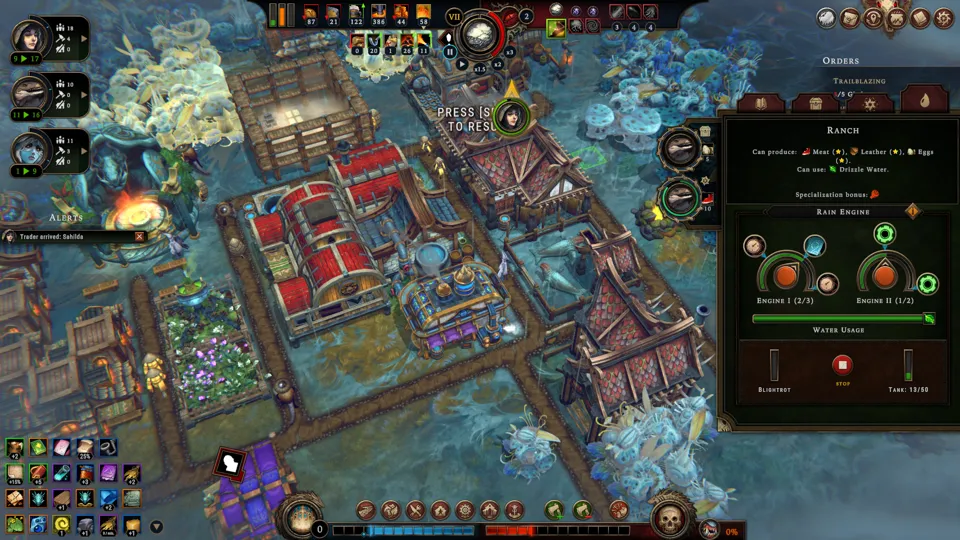 Oh, I didn’t talk about the water mechanic. Oh well.
Oh, I didn’t talk about the water mechanic. Oh well.
Against the Storm is a fun game and a good city builder. Its setting and game mechanics are replete with replayability, though those playthroughs do eventually get repetitive and dull. However, it’s in its philosophy and ethos that Against the Storm becomes far more interesting, as its ethics of bioconservatiionism weigh in on every action and every decision the player makes. It represents an entirely different way of thinking of what a city can be, and perhaps a version that deserves more consideration than its fantasy setting would suggest.
Developer: Eremite Games
Genre: City Builder, Strategy
Year: 2022
Country: Poland
Language: English
Play Time: 2-2.5 Hours/Round
Youtube: https://youtu.be/Ap1xWjSBdvI
